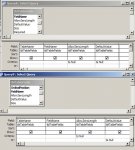How do I design a query that returns all records that have one or more null fields in them. Or one that returns records if one of a predetermined subset of the fields is null?
I can't for the life of me work out how to do it so any help would be welcome.
TIA
Tom
I can't for the life of me work out how to do it so any help would be welcome.
TIA
Tom

